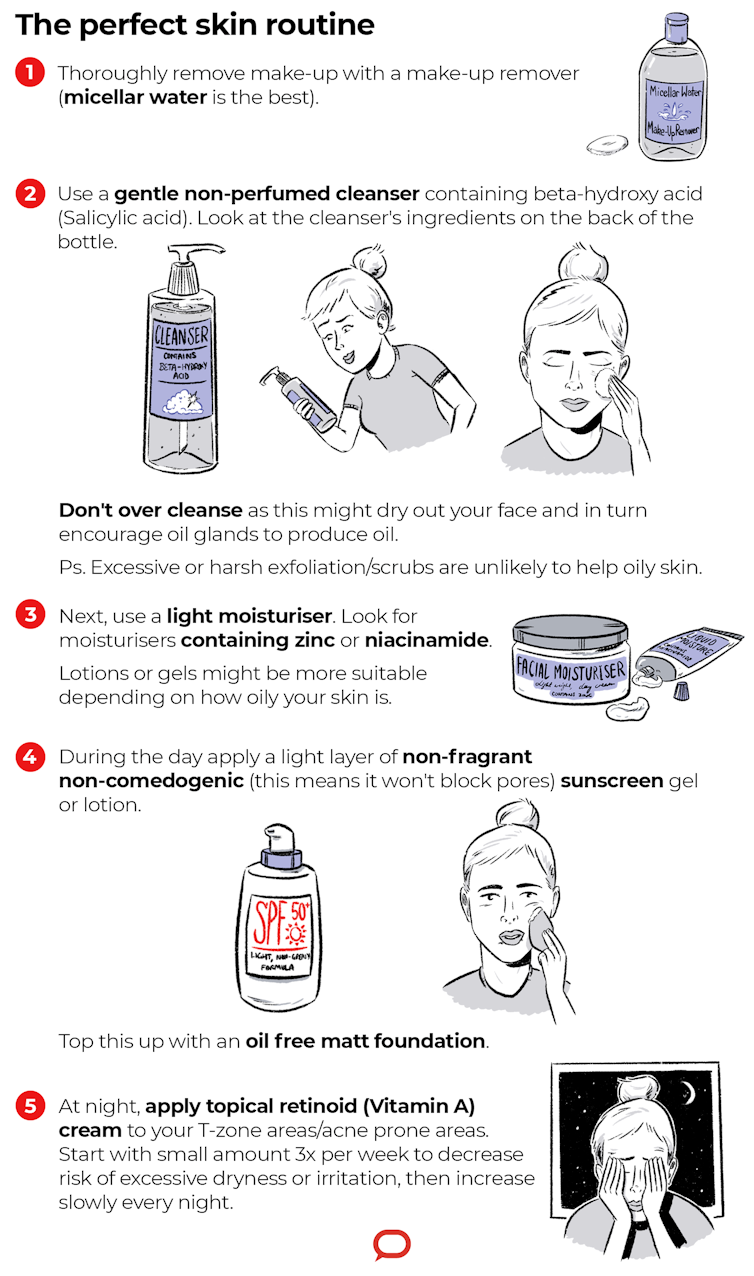
The I Need to Know series by The Conversation answers commonly asked (and commonly embarrassing) teen questions providing practical information and advice.
How can I control the excessive oil secretions on my face that leads to acne? - Anonymous
Pimples are the worst! They hurt, pop up overnight and can be impossible to hide.
You’re right that oily skin is believed to be the most critical factor for causing acne.
But rest assured, there are a few things you can do to keep your oil at bay and control the likelihood of a break out.
Why am I so oily… all the time!
Before we start talking about how to avoid acne, let’s chat about why oily skin causes acne.
Oily skin is caused by the overproduction of sebum by an overactive oil gland (also known as the pilosebaceous unit, which is just a fancy term for a hair follicle and its oil gland).
There are a few reasons we get acne, one being the pore of the oil gland can be blocked – this can be made worse by using certain types of makeup.
Some of our hormones during puberty drive sebum overproduction, hence acne-overload. Fun fact: anabolic steroids, typically used by bodybuilders, can trigger acne too.
Acne bacteria lives on the skin and its overgrowth around your oil glands can worsen inflammation and pus formation. This is what causes acne to hurt sometimes.
If there’s a strong history of acne in your family, there’s a good chance you might get it too.
It is also linked to medical conditions such as polycystic ovarian syndrome.
Read more: 'What is wrong with me? I'm never happy and I hate school'
Trust me on this, a proper skin routine is everything
As a dermatologist, I recommend cleaning your face every morning and evening. If you wear make up, ALWAYS wipe it off before going to bed – no excuses!

Using pore-clogging oil-based make up can worsen or cause acne. This can become worse if make up is not thoroughly removed!
If you want to hide your acne with make up, just be sure to use brands that contain good ingredients (I talk a bit more about this below).
A few tips to help keep your skin clear ??
Diet: Eat a healthy balanced diet containing low glycaemic index food groups with complex carbohydrates and omega-3 fatty acids. There might be a role for oral zinc supplements. It is best to avoid sugary, processed and refined food.
Make up and hair products: If you choose to wear make up, opt for mineral-based foundations, eg. La Roche Posay, Bare Minerals, Nude by Nature, Jane Iredale, Youngblood and Ultraceuticals. Wash your hair regularly with shampoo, especially if you’re using hair products and if you have oily hair or scalp. Avoid using oil-based products on your face and beware of oil-based pomades and hair wax, especially near your forehead.
Regular use of a good quality broad spectrum SPF 30 and above ultralight sunscreen lotion: This reduces early onset wrinkles, pigmentation issues and in the long-term reduces your risk of developing sunspots and dangerous skin cancers.
Maintain a healthy weight and embrace exercise: Not only is this good for mental health (stress can lead to acne), it also reduces levels of acne-causing hormones.
Read more: Common lumps and bumps on and under the skin: what are they?
About to leave the house and still feel oily?
I recommend using a blotting paper or oil-control film when this happens. They aren’t too expensive – Target sells packs of 100 for A$5 – and can be bought at supermarkets and pharmacies.
You can also apply a thin layer of mattifying gel or a mineral-based loose powder foundation to reduce and absorb excess oil.
Some final words of advice
Use oil-free and non-comedogenic cleansers, moisturisers and make up. When picking a foundation opt for “oil free” liquid silicone (dimethicone or cyclomethicone) matte foundations over oil foundations
remember to thoroughly remove your make up with a make up remover
avoid touching, picking or scratching your pimples
if you feel your acne is particularly bad, make sure you see your GP or get a referral to see a dermatologist. It’s always best to get on top of your acne and reduce risk of acne scarring.
I Need to Know is an ongoing series for teens in search of reliable, confidential advice about life’s tricky questions.
If you’re a teenager and have a question you’d like answered by an expert, you can:
- submit your question anonymously through Incogneato, or
- DM us on Instagram.
Please tell us your name (you can use a fake name if you don’t want to be identified), age and which city you live in. Send as many questions as you like! We won’t be able to answer every question, but we will do our best.![]()
Celestine Wong, Consultant Dermatologist, Monash Health
This article is republished from The Conversation under a Creative Commons license. Read the original article.
Chat back:
Share your story with Parent24. Anonymous contributions are welcome.
WhatsApp: Send messages and voicenotes to 066 010 0325
Email: Share your story with us via email at chatback @ parent24.com
Read more:
‘How do I clean my penis?’: Here's the answer to this surprisingly common teen question
My overweight teenage daughter won’t exercise – how do I help her?
Are you ready to teach your teen to drive?




 Publications
Publications
 Partners
Partners
















